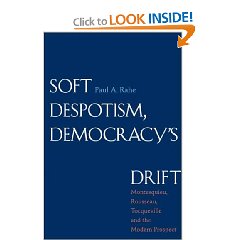
As other reviewers have noted, this is not for the lay person or even the average Libertarian, for whom I would like to see (and would benefit myself) a pamphlet or article version. This is erudition in its highest form, offering a painstakingly devised integration and application of the works of three author's to the question: “what is the ideal state of unfettered democracy, and where does the USA stand in that regard?”
The book begins with an utterly devastating full page quote from Tocqueville in which I underline the words “petty and vulgar pleasures,” “elevated an immense, tutelary power,” “a network of petty regulations,” and “it does not destroy, it prevents things from being born.”
Published in 2009 this book is totally current with our recent financial collapse based on Congressional failures of integrity combined with Wall Street moral hazard and bad judgment, and the author notes that as of 2008 25% or more of US citizens were not happy with the state of America or its government. I believe a more telling statistic is the migration of over 44% of the population away from the two-party tyranny and toward declared Independent status. See also:
Grand Illusion: The Myth of Voter Choice in a Two-Party Tyranny
Running on Empty: How the Democratic and Republican Parties Are Bankrupting Our Future and What Americans Can Do About It
Election 2008: Lipstick on the Pig (Substance of Governance; Legitimate Grievances; Candidates on the Issues; Balanced Budget 101; Call to Arms: Fund We Not Them; Annotated Bibliography)
I learn a great deal from this book, which once again confirms my view that most college courses are wasted on the young and should be reserved from more mature reflection. I read all this stuff in the 1970's in the original, and did not extract–could not comprehend–the nuances and catalytic connections I can appreciate today.
I am fascinated by the author's discussion of how one must read Montesquieu with a full appreciation for the double-talk necessary in a time of repressive and punitive censorship, and the author's clear depiction of how to read in the context of history, psychology, and sociology of the time being read.
See also:
The Lessons of History
The Landscape of History: How Historians Map the Past
This book is nothing less than a primer for those new to the political philosophy of the Founding Fathers, and also a master's seminar for those ready to reflect anew on prior learning.
See also:
The Thirteen American Arguments: Enduring Debates That Define and Inspire Our Country
What Kind of Nation: Thomas Jefferson, John Marshall, and the Epic Struggle to Create a United States
The bottom line comes early and is confirmed throughout the book: the American Empire is bankrupt and divorced from its past–it has followed in the paths of France, Germany, and Russia, instead of the more enlightened paths intended by the founders and summed up in Ron Paul's book of speeches, A Foreign Policy of Freedom: Peace, Commerce, and Honest Friendship.
Early on the author draws out the importance of education and especially of the formation of the young, and how political liberty, once won with hard-fought battle, must be maintained with education or it will have to be fought for again. We have failed our young and this is for me the center of gravity for the future, apart from Electoral Reform (see Electoral Reform Act of 2009).
See also:
Philosophy and the Social Problem: The Annotated Edition
Weapons of Mass Instruction: A Schoolteacher's Journey through the Dark World of Compulsory Schooling
I learn of Roseau's emphasis on corruption as the most likely destroyer of democracy, especially within its legislative branch; of Rousseau's anticipation that “courtiers” would become the norm in the academic and media classes; of his view that political ideology would displace religion as a means of moving crowds with fantasy; and of his concern that representation (intermediaries) is inconsistent with popular sovereignty.
Today the Nobel Prize for Economics was announced, and one of the two winners is Elinor Ostrom, who has pioneered collective decision-making with respect to common resources. Montesquieu was there first, maintaining that one *can* achieve peace and prosperity without giving up liberty, and I consider this to be a solid foundation for welcoming the honor rendered to Elinor Ostrom today.
This book helped me think about the inherent complementarity rather than opposition between politics as the art of achieving consensus on means, ways, and ends, and intelligence (decision-support). I realized in reading this book that the one constant that can assure that politics and intelligence work as they should, in the public interest, is INTEGRITY. I now see integrity as the grease that ensures the whole system of systems works well, and am certain Buckminster Fuller saw this in the same way.
The core concept presented by the author is that all three of the antecedent minds came to grips with the reality that if liberty is achieved and then lost, the intermediaries or tyrannies that will arise are much worse than those that were displaced (monarchy, nobility, clergy). The tyranny of the majority and legislative despotism are much less rational and much less equitable.
I am at the end of my allowed word limit and will finish this at Phi Beta Iota, the Public Intelligence Blog.




